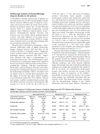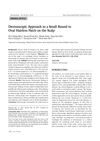 64 citations,
January 1998 in “Drugs”
64 citations,
January 1998 in “Drugs” Dienogest combined with ethinylestradiol is a highly effective birth control that improves menstrual symptoms and has manageable side effects.
 62 citations,
January 2003 in “Dermatology”
62 citations,
January 2003 in “Dermatology” Sunlight worsens hair loss; protect scalp.
 60 citations,
January 2014 in “Anais Brasileiros De Dermatologia”
60 citations,
January 2014 in “Anais Brasileiros De Dermatologia” Nanotechnology in dermatology shows promise for better drug delivery and treatment effectiveness but requires more safety research.
 59 citations,
April 2011 in “Retina-the Journal of Retinal and Vitreous Diseases”
59 citations,
April 2011 in “Retina-the Journal of Retinal and Vitreous Diseases” Finasteride may help treat chronic CSC, improving vision.
 56 citations,
November 1993 in “Journal of The American Academy of Dermatology”
56 citations,
November 1993 in “Journal of The American Academy of Dermatology” Capsaicin cream quickly relieved itching in two patients with brachioradial pruritus.
 50 citations,
August 2017 in “Diabetologia”
50 citations,
August 2017 in “Diabetologia” Metformin has limited effectiveness for improving PCOS symptoms and lacks clear benefits, needing more research to confirm its efficacy.
 49 citations,
November 1992 in “Archives of dermatology”
49 citations,
November 1992 in “Archives of dermatology” Different treatments for alopecia areata have varying success rates and side effects; intralesional steroids are most effective.
 47 citations,
December 2002 in “Journal of Neurochemistry”
47 citations,
December 2002 in “Journal of Neurochemistry” Progesterone boosts alcohol's effect on brain, finasteride counters it.
 47 citations,
December 2000 in “Archives of Dermatological Research”
47 citations,
December 2000 in “Archives of Dermatological Research” Androgens significantly affect female hair loss, and hormonal treatments may help.
 46 citations,
January 2015 in “Journal of The American Academy of Dermatology”
46 citations,
January 2015 in “Journal of The American Academy of Dermatology” Trichoscopy helps diagnose and assess the severity of Frontal Fibrosing Alopecia.
 46 citations,
October 2009 in “Archives of Dermatology”
46 citations,
October 2009 in “Archives of Dermatology” Loose anagen hair syndrome, often affecting young girls, can be diagnosed with a hair-pull test and usually gets better on its own, but severe cases may need treatment.
 45 citations,
November 2009 in “British Journal of Dermatology”
45 citations,
November 2009 in “British Journal of Dermatology” Women with early hair loss have higher blood pressure and aldosterone; screening and treatment may help.
 43 citations,
November 2007 in “Dermatologic Clinics”
43 citations,
November 2007 in “Dermatologic Clinics” Hair and nail changes can indicate health issues, including cancer and side effects from cancer treatments.
 42 citations,
November 2018 in “Archives of dermatological research”
42 citations,
November 2018 in “Archives of dermatological research” Apremilast was not effective in treating moderate-to-severe alopecia areata.
 41 citations,
January 2014 in “Annals of Dermatology”
41 citations,
January 2014 in “Annals of Dermatology” Dermoscopic examination helps diagnose different types of hair loss conditions by showing specific patterns.
 41 citations,
January 2007 in “Journal of Korean Medical Science”
41 citations,
January 2007 in “Journal of Korean Medical Science” Minoxidil and ATRA together boost hair growth more effectively than minoxidil alone.
 40 citations,
March 2019 in “Nature Communications”
40 citations,
March 2019 in “Nature Communications” CRAC channels are crucial for the development and function of specialized immune cells, preventing severe inflammation and autoimmune diseases.
 39 citations,
April 2010 in “International Journal of Pharmaceutics”
39 citations,
April 2010 in “International Journal of Pharmaceutics” Nanoparticles improve minoxidil skin permeation, but more research needed for effective hair growth.
 39 citations,
March 2009 in “Archives of Dermatological Research”
39 citations,
March 2009 in “Archives of Dermatological Research” Apigenin may help promote hair growth and could treat hair loss.
 38 citations,
November 2000 in “Hastings Center Report”
38 citations,
November 2000 in “Hastings Center Report” The document suggests medicine should integrate biological and cultural factors and focus on holistic, equitable care.
 38 citations,
July 1989 in “Archives of dermatological research”
38 citations,
July 1989 in “Archives of dermatological research” Testosterone causes hair loss in AGA mice, which are good for testing baldness treatments, and both minoxidil and cyproterone acetate can prevent this hair loss.
 37 citations,
February 2007 in “Clinical Obstetrics and Gynecology”
37 citations,
February 2007 in “Clinical Obstetrics and Gynecology” The document concludes that treating PCOS requires a combination of drugs to manage reproductive and metabolic symptoms, with more research needed on combination therapies.
 36 citations,
October 2009 in “Journal of Investigative Dermatology”
36 citations,
October 2009 in “Journal of Investigative Dermatology” Dihydrotestosterone can be made from dehydroepiandrosterone in skin cells without needing testosterone.
 35 citations,
April 2008 in “Human Molecular Genetics”
35 citations,
April 2008 in “Human Molecular Genetics” Skin and hair can help us understand organ regeneration, especially how certain stem cells might be used to form new organs.
 35 citations,
October 2004 in “Biology of Reproduction”
35 citations,
October 2004 in “Biology of Reproduction” PNU157706 reduced rat sperm movement and fertility without affecting offspring health.
 34 citations,
November 1987 in “Archives of Dermatology”
34 citations,
November 1987 in “Archives of Dermatology” Oral minoxidil helps hair regrowth in 80% of alopecia patients, but only 18% see cosmetic improvement.
 33 citations,
February 1999 in “The journal of investigative dermatology/Journal of investigative dermatology”
33 citations,
February 1999 in “The journal of investigative dermatology/Journal of investigative dermatology” IGF-1 increases whisker growth in transgenic mice.
 32 citations,
April 2014 in “American Journal of Clinical Dermatology”
32 citations,
April 2014 in “American Journal of Clinical Dermatology” People with psoriasis are more likely to have Metabolic Syndrome than those without psoriasis.
 32 citations,
February 2014 in “Psychopharmacology”
32 citations,
February 2014 in “Psychopharmacology” Dutasteride makes alcohol less sedating and may lead to less drinking in men.
 32 citations,
December 2009 in “Archives of Dermatological Research”
32 citations,
December 2009 in “Archives of Dermatological Research” Dihydrotestosterone increases certain inflammatory signals in skin cells, potentially contributing to acne.






























